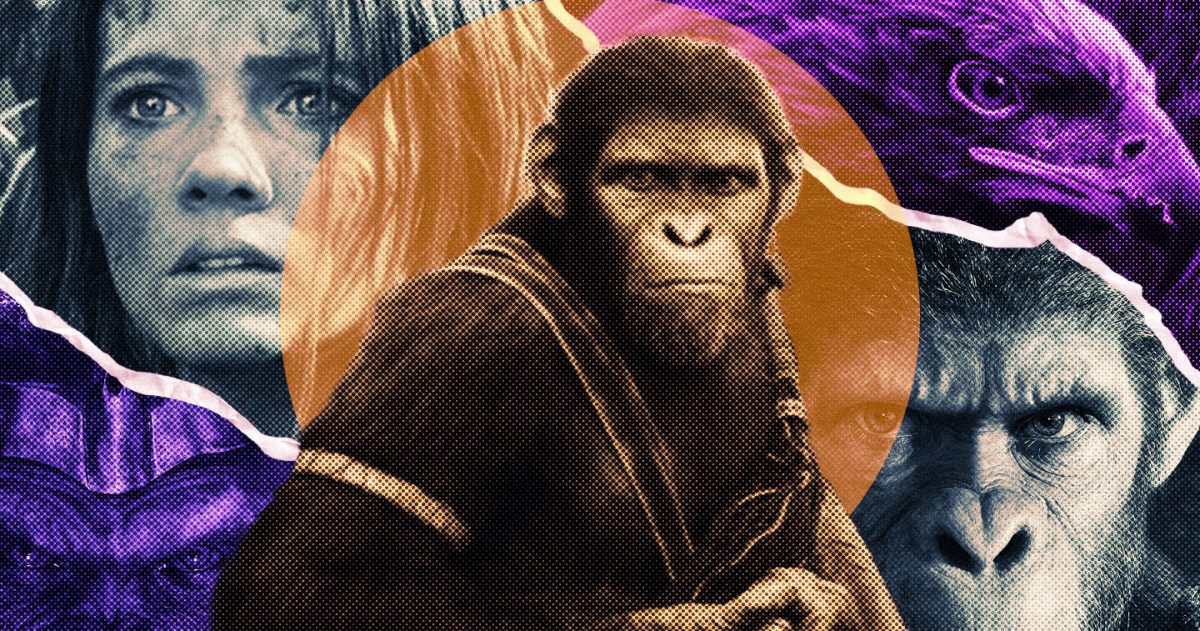MANILA, PHILIPPINES — Set 300 years after the death of Caesar, the central character in the Planet of the Apes reboot trilogy, Kingdom of the Planet of the Apes sees a new civilization of apes thriving and bonding with eagles, immediately establishing themselves differently from humans. Whereas the former could also tame animals, the apes leave them with enough resources to thrive without fear of extinction.
The film begins with little backstory but shows enough parallels to the original movies. Caesar’s character is retired from the get-go, with Kingdom‘s story building on his legacy to introduce a new adventure in a post-apocalyptic Earth. The return to the cinematic universe of the Apes introduces Noa, a young ape from the eagle clan who sets out on a rescue mission after an attack that took away his family and cost his father’s life.
On his journey, Noa encounters a lone orangutan, Raka, who realizes he must join Noa in his quest and later, they tag along a human they initially name Nova, a female soldier in the pretense of a not-so-but-more-intelligent-average human, whose species has regressed into a more primate-like state in this period. The elder and kinder Raka plays a good balance to the earnest but emotionally wounded Noa. Together, the three set off on Noa’s journey, but not before encountering a herd of humans. Noa decides he must leave Nova with her kind, and Raka to teach them the beliefs of Caesar.
In a gripping chase that ensues, Noa and Raka witness Nova’s utterance of a single word — a callback to Caesar’s own first word in the first film of the reboot franchise, Rise of the Planet of the Apes (2011). Whether intelligence or the ability to communicate is the decisive factor of being human is something that the new movie brings to question through this thematic reversal.
Nova, whose real name is Mae, later reveals that although she chooses not to, she can speak, much to Raka’s amazement. She knows where Noa’s family was taken: a coastal zone ruled by the power-mad Proximus Caesar. The self-proclaimed leader has forced other apes into failed attempts to open a sealed vault, which he believes contains the key to evolution. However, he sees evolution as a means of becoming all-powerful rather than a holistic development that would benefit his kind.
In this encampment, Noa is reunited with his mother and friends, while Mae meets another intelligent human, Trevathan, who has become complicit in the new kingdom building. She later rejects his suggestions to cooperate and make the most out of her situation.
The conflicting interpretations of the original Caesar’s philosophies between Raka and Proximus save the film from predictability. Whereas Raka lives by “ape not kill ape” and “apes together strong,” Proximus weaponizes these words into enslaving his fellow apes in building his kingdom, becoming more human-like by making them turn on each other.
While Raka is will predictably be the favorite character, it also pays to watch Mae’s character development. Her display of cunning, a trait often attributed to monkeys, fears of what apes are capable of, and her resolve to make hard choices to save mankind — including killing another human without flinching — just to carry out her mission is compelling.
Instead of revulsion from Mae’s actions, Proximus sees this as an opportunity and wants to wield weapons of destruction for himself. Meanwhile, Noa is propelled by a sense of justice for what he has lost and a desire to bring his tribe home. He eventually harnesses his tribe’s eagle chant to enlist the birds’ help in a standoff with Proximus Caesar.
Mae makes a reappearance, presumably to say goodbye to Noa, but is instead reminded of Raka’s kindness. Her dropping of her gun shows scant optimism but is a telling sign that Noa’s peacekeeping efforts have worked… for now. Their bias that only one species can dominate has forthcoming consequences.
In the end, Noa succeeds in bringing his tribe home and Mae in retrieving the key to satellite communication, which allows her base to contact intelligent humans elsewhere.
Kingdom of the Planet of the Apes tells a dynamic story but is fragmented in its continuity because it focuses on exploring a broad expanse of the franchise rather than fulfilling the current demand of its own story. However, its emotional pull is effective not just through the deaths of characters but in a particularly cinematic scene where an eagle decides to land on Noa’s arm, signifying him a worthy successor to his father as the master of birds.
This film succeeds in establishing a new landscape, sparing no expense on CGI and special effects to immerse a new generation of movie-goers in its imaginative world. Although no cliffhangers were apparent, it also evokes a sense that something grander will come.
Wes Ball‘s Kingdom of the Planet of the Apes did an excellent job of balancing the nostalgia for the original fans of the franchise with a story compelling enough to question what went wrong with the passage of Caesar’s beliefs and how Proximus gets it so twisted.








